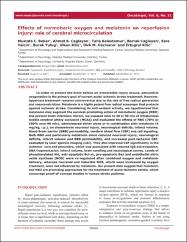Effects of normobaric oxygen and melatonin on reperfusion injury: Role of cerebral microcirculation

Göster/
Erişim
info:eu-repo/semantics/openAccessAttribution 3.0 Unportedhttps://creativecommons.org/licenses/by/3.0/Tarih
2015Yazar
Beker, MustafaÇağlayan, Ahmet Burak
Keleştemur, Taha
Çaǧlayan, Berrak
Yalçın, Esra
Yuluǧ, Burak
Kılıç, Ülkan
Hermann, Dirk Matthias
Kılıç, Ertuğrul
Üst veri
Tüm öğe kaydını gösterKünye
Beker, M., Çağlayan, A. B., Keleştemur, T., Çaǧlayan, B., Yalçın, E., Yuluǧ, B. ... Kılıç, E. (2015). Effects of normobaric oxygen and melatonin on reperfusion injury: Role of cerebral microcirculation. Oncotarget, 6(31), 30604-30614. https://dx.doi.org/10.18632/oncotarget.5773Özet
In order to protect the brain before an irreversible injury occurs, penumbral oxygenation is the primary goal of current acute ischemic stroke treatment. However, hyperoxia treatment remains controversial due to the risk of free radical generation and vasoconstriction. Melatonin is a highly potent free radical scavenger that protects against ischemic stroke. Considering its anti-oxidant activity, we hypothesized that melatonin may augment the survival-promoting action of normobaric oxygen (NBO) and prevent brain infarction. Herein, we exposed mice to 30 or 90 min of intraluminal middle cerebral artery occlusion (MCAo) and evaluated the effects of NBO (70% or 100% over 90 min), administered either alone or in combination with melatonin (4 mg/ kg, i.p.), on disseminate neuronal injury, neurological deficits, infarct volume, blood-brain barrier (BBB) permeability, cerebral blood flow (CBF) and cell signaling. Both NBO and particularly melatonin alone reduced neuronal injury, neurological deficits, infarct volume and BBB permeability, and increased post-ischemic CBF, evaluated by laser speckle imaging (LSI). They also improved CBF significantly in the ischemic-core and penumbra, which was associated with reduced IgG extravasation, DNA fragmentation, infarct volume, brain swelling and neurological scores. Levels of phosphorylated Akt, anti-apoptotic Bcl-xL, pro-apoptotic Bax and endothelial nitric oxide synthase (NOS) were re-regulated after combined oxygen and melatonin delivery, whereas neuronal and inducible NOS, which were increased by oxygen treatment, were not influenced by melatonin. Our present data suggest that melatonin and NBO are promising approaches for the treatment of acute-ischemic stroke, which encourage proof-of-concept studies in human stroke patients.
Scopus Q Kategorisi
Q1Kaynak
OncotargetCilt
6Sayı
31Koleksiyonlar
- Makale Koleksiyonu [302]
- Makale Koleksiyonu [3790]
- PubMed İndeksli Yayınlar Koleksiyonu [4251]
- Scopus İndeksli Yayınlar Koleksiyonu [6601]
- WoS İndeksli Yayınlar Koleksiyonu [6677]


















